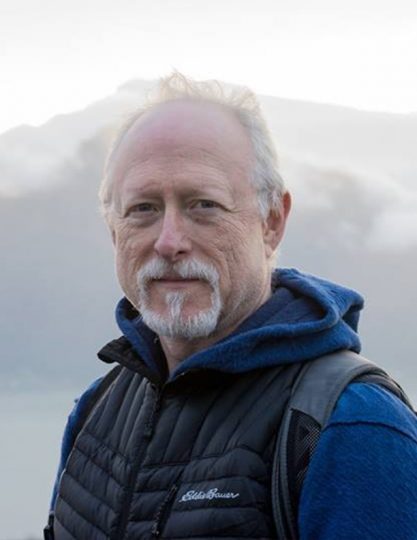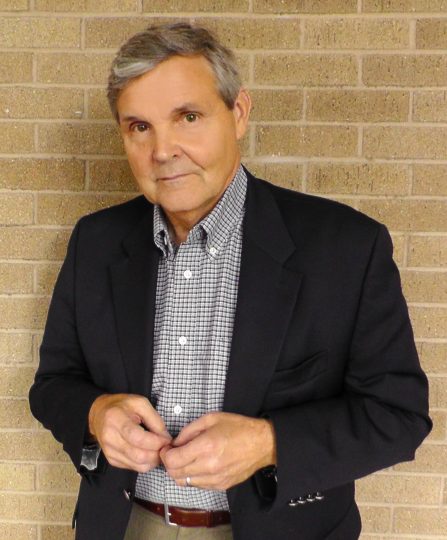We recently sat down with Building the Wall playwright, Robert Schenkkan, and director, Brant Pope, to discuss where the current state of American politics and artistic expression through the performing arts overlap and how challenging new plays can act as a medium for continued discussion of current issues.
What has been the most challenging part of directing this play?
Brant: The most challenging part of directing this play is the structure of the piece itself. The story is unknown and is a shock-thriller for the audience, but both characters already know everything that happens. So the challenge is to give the characters something that they’re fighting for, not just telling the story; to work with the script in a way that the characters have something at stake and not just talking about something that they both know already happened.

How does Building the Wall fit in with contemporary theatre? How does it speak to what artists and audiences are looking for and what emotions might it be reflecting back?
Robert: Theatre has always spoken directly to the issues of the day, and this has been true as far back as Sophocles. When I wrote Building the Wall in October of 2016 there was tremendous sense of political polarization in the country, a lot of dangerous, race-baiting rhetoric and a great deal of anxiety about our immediate future. None of that has gone away, indeed, if anything, it has accelerated. Who would have predicted Nazis and Klan members proudly marching in the shadow of Thomas Jefferson’s university? Or the President of the United States not being able to immediately and completely disavow such a thing? In such circumstances, theater can be an important place for audiences to productively engage with these issues and their attendant anxieties and 1) remind themselves that they are not alone but are part of a community and 2) process what they are feeling. My sense of the country post-election is that audiences were hungry for exactly this kind of experience.
Brant: I think that Schenkkan is the kind of writer and certainly I’m the kind of theatre person that really takes joy in plays and playwrights that engage, directly, the spirit of the times. A play like The Crucible did the same thing. Both Schenkkan and Arthur Miller are playwrights that are fully immersed and engaged in society and want to write about that. For me, it’s art-making that allows the audience a vivid and intuitive way to go out in the lobby afterwards and talk and argue and discuss about exactly what they’re living through. This is the kind of theatre I’m most excited about. Both of these characters exist in the world and this play engages the socio-political forces of the moment in an artistic way. I really love that.
[To Robert] Why do you think it was important to roll this play out so quickly?
Robert: I felt we had reached a critical moment in the history of the Republic, a potential turning point, and it was very important to acknowledge what was happening now and to get people to be aware of the power they had to influence events for better or worse. The thing I worry about most in this crisis, is people essentially abdicating their moral responsibility to the state on the false assumption that “it doesn’t really matter what I do,” or “other people know better and I should just leave it to the experts.” History has taught us that is the moment when Democracies fail.

[To Brant] As a director, why is it important that this is the regional premiere for Texas? what is the significance of doing this play at The University of Texas?
Brant: It’s important for The University of Texas because this is a major playwright who is also an alumnus of the department. I don’t think doing a premiere is as important as what premiere you’re doing. We’re doing the premiere of a play by our alum, by an extraordinary playwright who just won the Tony last year, that comes at a time when this type of work is so important. So necessary.
Universities should engage people in dialogue. A good play is not one that tells you what to think or how to act or how to vote, but rather asks deep questions about things and gets people talking about those issues. That’s what a university should do. So I’m fond of this kind of theatre. I like plays of realism that deal with the issues of the time. The importance for us is that we were able to create panels and bring our students into it to talk about doing theatre of this sort – controversial theatre. It may be easier for us to do this than a professional theatre because we’re able to create an extensive platform for discussion.
Political tensions are high in America right now. Why do you think expressing those concerns in this way is critical and where do you think it leaves us as a society?
Brant: I think that the play asks questions that help us engage the moment. The play does a good job of presenting and examining both sides, so to speak, of the current passions. It dramatically speculates on what might happen in the future. That’s what a play does; a play is not always a documentary, it’s purpose is not to document fact, but it is to speculate both on why people do what they do and what might happen in the future.
Robert: As every psychologist will tell you, powerful feelings, unexpressed, turn inward or find unhealthy means of expression. We need to talk about what is going on right now and become very clear about our values and what we will and will not accept as a society. Theatre can very much play a role in this critical dialogue. Another way to frame the current conflict is that this is actually a fight over the narrative – the story of who we are as a country and as a people; what we, the United States, stands for. What better place to engage these issues than theatre, which has, from its very beginning, always been about community and storytelling.
Building the Wall is on stage August 30 – September 10, 2017 at the Oscar G. Brockett Theatre. We invite you to join the conversation and engage with artists, patrons and scholars on September 7, 2017 through a series of panels and discussions. Details listed below. The above panels are free and open the the public. Seating may be limited. Panel times, location and respondents are subject to change.
Panel: Writing and Producing New Work in the American Theatre
2:00 p.m. / Oscar G. Brockett Theatre
Respondents include: Vivienne Benesch (Producing Artistic Director, PlayMakers Repertory Company), Cal MacLean (Producing Artistic Director, Clarence Brown Theatre), Marissa Wolf (Director of New Work/Artistic Associate, Kansas City Rep), Robert Schenkkan (Playwright) and Kirk Lynn (Playwright, The Method Gun, Fixing King John).
Panel: The Role of the Critic and Scholar in Assessing New Work
4:00 p.m. / Oscar G. Brockett Theatre
Respondents include: Michael Barnes (Columnist, Austin American-Statesman), Robert Faires (Arts Editor, The Austin Chronicle), Jay Handelman (Arts Editor and Theatre Critic, Sarasota Herald-Tribune), Robert Schenkkan (Playwright), Roxanne Schroeder-Arce (Scholar, Playwright, Mariachi Girl) and Kirk Lynn (Playwright, The Method Gun, Fixing King John).
A Conversation with Playwright Robert Schenkkan and Director Brant Pope
Immediately following the September 7 7:30 p.m. performance / Oscar G. Brockett Theatre
Patrons are invited to a post-performance conversation with Playwright Robert Schenkkan and Director Brant Pope regarding the play’s development process, the role of the playwright and the play’s themes. This event is open to ticket holders for the September 7 performance.

